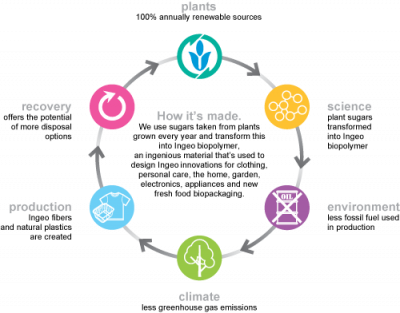Biopolymers are polymers derived from natural sources. One such example is Ingeo, which is derived from sugars produced by plants during the cycle of photosynthesis. Plants convert air, water, nutrients from soil in presence of light to starch, which is the basic constituent of all fruits and vegetables. In an initial stage, Ingeo has been made from corn sugar, but can also be made from any natural sugar source.
It involves synthesizing this sugar into a resin, which is then converted in to fiber and can be used for garments, personal care, appliances and as a bio packaging material. This makes it a natural plastic, which is derived from 100% natural sources, and does not pollute the environment as its biodegradable, Ingeo uses less energy while being produced, which mean lesser emission of greenhouse gases.
Research is in progress to harness other sources of natural sugars, such as from cellulose, agricultural waste, and other plant sources. The carbon footprint during the manufacture of Ingeo is estimated to be 60% less than that from ordinary PET synthesis, and hence is Eco-friendly. This natural polymer can be used just as normal plastic resin in the manufacture of consumer goods, containers, films, cartons, apparel, textiles, electronics etc.
Let’s look in detail as to how this is done.
Firstly, natural sugar is obtained from plant sources, and is converted into lactic acid by special Microorganisms, which alter the chemical structure of sugar.This lactic acid molecules then link with each other to form long chains, similar to ester chains in normal plastics. This long chains are called Ingeo Polylactide polymer chains, and are converted into pellets. This pellets form the starting point of its wide usage, and they can be molded into different shaped and sizes to create a versatile range of
products.
Now let us look at one more aspect of using plastics-which is disposing plastic wastes. Conventional plastic goods are often burnt or end up in landfills which does pollute air and soil. They are also recycled and produced into new goods. With Ingeo, you can safely dispose the used plastics gods, as they arebiodegradable, and do not pollute the environment. They also do not release toxic gases and can beeasily incarcerated. Also, disposable utensils made from Ingeo can always be safely composted, which isone advantage over using normal plastics for disposable foodstuffs.
Ingeo can be made from natural sources, and do not require any genetically modified crops. They can be synthesized from natural plant sugars such as wheat, sugar beet, sugarcane etc. Also, the current usage of corn for making Ingeo is only 0.05% of the total corn production, and hence does not affect the food cycle.
For more details on Ingeo, please access their site at www.naturalworksllc.com. You can also buy Ingeo pellets online, and can also find manufactures who use Ingeo for their product ranges.


